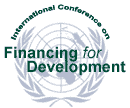
Department of Public Information - News and Media Services Division - New York
18-22 March 2002
19 March 2002
 |
International
Conference on Financing for Development Department of Public Information - News and Media Services Division - New York |
|
| Monterrey, NL, Mexico 18-22 March 2002 |
19 March 2002 |
|
PRESS BRIEFING ON MINISTERIAL ROUND TABLES
"Ministerial Round Table 2 had discussed the need to change the terms of international investment, a complex undertaking requiring rules to govern disorderly capital and financial flows, Co-Chair Didier Opertti-Badan told correspondents at today's evening press briefing.
Mr. Opertti-Badan, Minister for Foreign Affairs of Uruguay, said that, according to figures, 75 per cent of investment was carried out in the industrialized countries, creating a circuit that had frozen the development process. If that continued, the investment share of underdeveloped and developing countries would never be enough to attain higher levels of development.
Regarding international debt, he said the round table had heard a proposal by the head of the Economic Commission for Latin America and the Caribbean (ECLAC) to create a regional inter-bank network among central banks works, establishing a massive, manageable fund. A decision to use such resources would not be a mere discretionary act, but rather a conscious decision taken in light of the possibility of the countries concerned to repay them.
That idea had financial, as well as political, value, he said. Politically, it would remove the influence of alien financial institutions that were out of step with the countries of the region. The Bretton Woods agreements should be revised, he added, but they had become, like the United Nations Charter, almost untouchable.
Paa Kwesi Nduom, Co-Chair of Ministerial Round Table 1 and Minister for Finance of Ghana, said the meeting had expressed concern that, despite their calls for market liberalization, developed countries themselves had not liberalized. "Let's practise what we preach", he said. The round table had also concluded that aid should not be tied to the purchase of goods from the donor countries. Official development assistance (ODA) should benefit the recipient countries and not the donors, he added.
The Co-Chair said concern had also been expressed that, despite their best efforts, most developing countries would be unable to meet the millennium goals on their own without a significant increase in ODA. Pointing out that more than half of Africa's population existed on less than a dollar a day, he said domestic tax revenues would never be enough to generate development, no matter what reviews and structural adjustments were carried out.
Shaukat Aziz, Co-Chair of Round Table 3 and Finance Minister of Pakistan, said his meeting had reached consensus on the need to build greater ownership of partnerships between donors and recipients.
The meeting had also discussed the effectiveness of donors and of aid, he said, adding that there was also a need to monitor the donors, as well as the recipients. He also stressed the need to build absorptive capacity in developing countries; otherwise, throwing money at them would be futile. Aid should not be seen as a permanent crutch, but only as a vehicle to make them recipients self-reliant.
Mugur Isarescu, Co-Chair of Round Table 4 and Governor of the National Bank of Romania, said his meeting had discussed the need for domestic and international reform. On the domestic level, that would include good governance, sound macroeconomic policies, a better environment for private investment and capacity building. Internationally, it would involve increased market access, debt relief and stabilization of international financial markets.
The round table had also proposed the creation of a forum for business entities from the North and South; an international task force focusing on global public goods; a permanent consultative forum on financial and debt issues; and greater participation by developing countries in resolving international economic and financial issues.
Asked to expound on the proposed regional inter-bank network, Mr. Opertti-Badan said it would involve a high level of decentralization, perhaps resulting in an overall review of the international financial system.
Responding to a question on the closing of the round tables to the media, Susan Markham, Spokeswoman for the International Conference on Financing for Development, said the Preparatory Committee had made that decision. However, the Bureau of the Conference was meeting to discuss the issue.
Press Conferences
Conference News